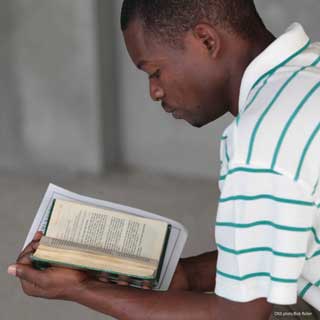The Word from Lansing: Pushing Back Against Racism

Posted February 22, 2019
In the face of tremendous hostility and hatred, American civil rights icon Rev. Dr. Martin Luther King Jr. demonstrated the necessity for courage, justice, and action for the world to see. Commenting on his example of faith lived in public life, the U.S. bishops write that society needs “artisans of peace” like Dr. King. His religious life as a Baptist minister, regrettably, is often under-appreciated, or intentionally disregarded. Like Dr. King, people of faith have a role to play in advocating in the public square for peace and justice for all races.
Within the Catholic Church herself, there are many examples of African-American Catholics whose faith and courage have led to action against injustice, including Daniel Rudd (1854–1932), Thomas Wyatt Turner (1877–1978), Dr. Lena Edwards (1900–1986), and Sr. Thea Bowman FSPA (1937–1990). Their lives inspire and challenge all who cross their path. A recent statement from the U.S. Conference of Catholic Bishops, “Open Wide Our Hearts: The Enduring Call to Love,” described these Catholics as tireless workers who pushed against the current of racism:
- Daniel Rudd was a black Catholic journalist and founder of the National Black Catholic Congress, which works to improve the lives of African-American Catholics.
- Thomas Wyatt Turner was a civil rights activist, biologist, and educator. He founded the Federated Colored Catholics, which protested discrimination in churches, schools, hospitals, seminaries, and convents.
- Dr. Lena Edwards was one of the first African-American women to become a board-certified obstetrician-gynecologist. She lobbied for better health care for all, especially the poor.
- Sr. Thea Bowman was a Franciscan Sister of Perpetual Adoration and teacher. Despite struggling with breast cancer, Sr. Thea often spoke to groups about African-American history, spirituality, and the need for inclusivity in the Church.
Their stories enrich our collective understanding of action on behalf of justice. Their stories teach valuable lessons about embracing individuals of all races. Their stories remind of the difficult journey they and countless others have taken to improve Catholic communities and society.
The history of our nation is a history in which African-Americans often have been treated as inferior or unworthy. Unfortunately, in times past, this has been equally true in some Catholic institutions. Soft prejudice and overt acts of racism faced by African-Americans fail “to acknowledge the human dignity of the persons offended;” they fail to recognize that God made all as brothers and sisters in His image. They also fall short of Jesus’s core teaching to “love one another.” In short, racist attitudes and beliefs are sinful and offensive to God.
The Gospel, on the other hand, speaks boldly to equality and human dignity among peoples. Aided by this benevolent teaching, strong actions against racism and injustice within the Catholic Church must be promoted and exemplified: in 1963, for example, Michigan Catholic Conference fought for human dignity within the public realm, promoting civil rights for all and opposing discrimination in schools, housing, and unfair loan practices. The Conference also actively engaged in job training for migrant workers. These actions took place prior to the federal Civil Rights Act of 1964. That year, many religious and lay Catholics marched alongside Dr. King, making a strong statement of support for racial equality. Just last year, the U.S. bishops advanced Sr. Thea Bowman’s cause for sainthood, recognizing her leadership in promoting greater racial inclusivity within the Church.
While many positive efforts have taken place, the U.S. bishops in their recent document have sought to address head on the sin and stain of racism that exists in the minds of many to this day. The U.S. bishops are reminding Catholics to “engage the world and encounter others,” noticing those “on the peripheries of our own limited view” (Open Wide Our Hearts). Thus, we can begin by listening to the experiences of others, developing authentic relationships, educating one another on issues of race and injustice, and learning to welcome those whom we encounter.
Thankfully, the bishops’ statement leaves its readers with a message of hope. Even though the work of protecting America’s values—such as liberty, equality, and justice—for all people can be difficult: “in Christ we can find the strength and the grace necessary to make that journey.” Let us as Catholics lead the way.
